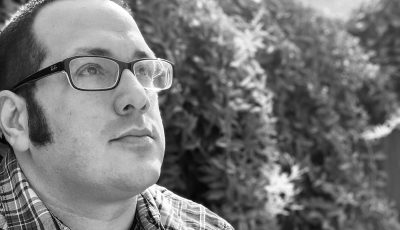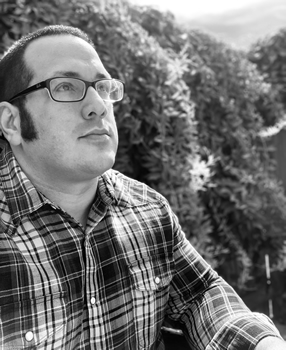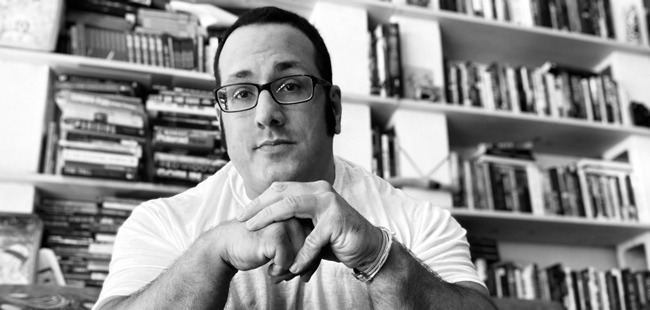

Between the Lines: Gabino Iglesias
The Spaces Between
If you’re a writer who uses Twitter, there’s a good chance Gabino Iglesias has talked you through a rough day. Thanks to a devoted base of followers and a commitment to lifting up writers at all stages of their careers, Iglesias has forged an enthusiastic community that sometimes feels like a 32,000-member support group and sometimes like an army of resisters gearing up for a third-act, so-crazy-it-just-might-work assault on an enemy fortress.
It seems that years of practicing what he preaches—discipline, resilience, and an almost-pathological refusal to accept defeat in the bloody publishing trenches—is paying off for Iglesias. After several critically praised indie hits, his latest novel, THE DEVIL TAKES YOU HOME, sold at auction to a major publisher, with Sony promptly locking down screen rights in what Deadline described as “a competitive situation.” (Juan of the Dead writer-director Alejandro Brugués is already attached to adapt.)
Iglesias’s Big Four debut is proof that conformity is optional. THE DEVIL TAKES YOU HOME, about a man forced into a criminal underworld by our heinously unjust healthcare system, defies the kind of elevator-pitch simplicity you might expect from a major summer release. The setup is deceptively straightforward: To pay for his young daughter’s cancer treatment, a man named Mario agrees to work for a criminal acquaintance. When he’s handed a gun and told to kill a man, Mario goes along with it—and soon finds himself immersed in a world populated by monsters both figurative and literal.
If you’re just here for skull-popping action and skin-crawling horror, THE DEVIL TAKES YOU HOME delivers. But if you’ve read Iglesias’s previous novels, including Zero Saints and Coyote Songs, you know it’s not that simple. THE DEVIL TAKES YOU HOME is equal parts gritty noir and gory, sometimes-surreal supernatural horror, and it includes frequent passages of untranslated Spanish and Spanglish. (Iglesias makes sure monolingual readers are never truly excluded, but, as he points out in the following interview, bilingual readers will have a different experience with the book.) It’s both a fast-paced thriller and a nuanced, elegiac tale of a man who’s forever fighting his way through strange, inhospitable lands, whether it’s a country where he’s forever an “other” or a monster-infested underworld. Like his previous books and his many short stories, Iglesias’s new novel is an exercise in navigating the spaces between: between cultures, between languages, between worlds, and between genres.
In his first-ever interview with The Big Thrill, Iglesias talks candidly about making the jump from small presses to the Big Four, how anger and frustration motivated him to finish THE DEVIL TAKES YOU HOME while navigating a job loss during a pandemic, and why he had to invent a subgenre to give himself a place to live.
For starters, please give us a little background about what inspired THE DEVIL TAKES YOU HOME and how the story took shape for you.
I’m always trying to tell stories that are packed with my favorite elements from crime and horror fiction, but also try to use my work to talk about the things I care about. THE DEVIL TAKES YOU HOME was a mix of those things, just like my previous two novels. I wanted to explore different kinds of migrations, identities, and syncretism while also talking about our awful healthcare system, our relationship to violence, and racism. Lastly, crime and horror share a dark heart in which we see regular people thrown into awful situations, and then the story we read is about them trying to make their way out of it, trying to survive. This novel is about that, about what normal people are capable of when they’re desperate.
Can you recall a single moment when Mario really came into focus for you?
Definitely! The moment I woke up on June 1st, 2020. I wrote about 45,000 words of THE DEVIL TAKES YOU HOME with one hand while eating a sandwich with the other. I was a high school teacher for two years while also working on reviews for a plethora of venues and teaching at SNHU’s online MFA program. Lunch was thirty minutes, and I tried to use them as well as I could. Then I lost my high school teaching job, which was my main source of income and the gig that had health insurance. Suddenly lacking a full-time job and finding myself without insurance yet again as the pandemic was raging made me understand Mario much more than I already did.
THE DEVIL TAKES YOU HOME frequently includes passages of untranslated Spanish, which prompts two questions for me. The first is, did you get any pushback on that choice?
I did, I do, and I will continue to get pushback for as long as I write. Luckily, Josh Kendall, my editor at Mulholland Books, was familiar with my work and understood what I’ve been doing. He was with me all the way on the Spanish, the Spanglish, and not using italics for the Spanish. I’m a nonnative speaker, so if I were to use italics for the “other” language, I’d use them on the English. I taught ESL classes to undocumented workers in Austin for a while, and they navigate a world they often can’t understand. If I can make monolingual readers feel a little lost or a little uncomfortable, mission accomplished. Welcome to our daily reality. I was doing a big interview about two weeks ago and suddenly remembered “agua oxigenada,” but my brain was blanking on the translation, which is “peroxide.” I think most bilingual/multilingual folks have moments like that. I try to bring that to the page.
Second: Will bilingual readers have a different experience with the book than monolingual ones?
I hope so! This is their world. This is how we talk, how our brains work. We don’t need Google translate because our brains are constantly doing it. There are many people in this country who inhabit an interstitial space between cultures, and that often means they also inhabit an interstitial space between languages. THE DEVIL TAKES YOU HOME brings them into that world, and they know it well, so I hope they enjoy it and see themselves in its pages.
A novel is such a major undertaking; there’s the writing of it, of course, then you’re spending months and months revising, polishing, and then promoting it—and that’s if everything happens quickly. How did you know this was the story you wanted to spend the next couple of years on?
I was angry. Then I got angrier. I wanted to tell Mario’s story in order to explore racism, anger, our healthcare system, and write a few “bad guys” that weren’t boring and one-dimensional. I wanted to start bringing in more Puerto Rican stuff into my work as a way of mentally transitioning to my next novel, which takes place entirely back home. Also, I think every writer gets a bit better with each book (you know, we hope!), and I felt like I wanted to try to write a sad, angry book that would make people feel many things while also delivering chaos, mayhem, monsters, mutilation, weird religious/cult vibes, and adrenaline rushes. Did I pull it off? I really hope so, especially because I know the mix, if it worked, will make readers happy.
How has your work as a book reviewer influenced your work as a writer?
Not at all. I switch hats. I read a LOT of great books every year. I enjoy them—am in awe of them—as a reader and do my best to deconstruct them and discuss their merits as a reviewer, but I keep my own writing separate because I’m afraid if I don’t, I might try to do what some of the writers whose work I admire are doing, and that would pull me away from doing what I’m trying to do and affect the voice and style I try to bring to the page.
That said, it has helped me understand that my work, like the work of every writer out there, is not for everyone. Sometimes I read a “bad” review that says a book is too violent, too brutal, too political, or too dirty, and my immediate response to that is “Yes! Give it to me! This is exactly the kind of narrative I love.” My books are those things, and when you mix that with the Spanish/Spanglish, some people hate them. Some folks don’t want to read about injustice or poverty or racism, and that’s okay. Romance is a genre that consistently delivers happy endings. I can’t write a happy ending to save my life. It’s good to have options, and you’re not always going to be what readers turn to, and that’s fine.
This book represents a big leap for you professionally—it sold at auction to a major publisher, and Sony has already picked up adaptation rights. Do you think it’s inherently more accessible than Coyote Songs or Zero Saints?
I’ve gotten better at making sure context gives everything monolingual readers need in order to fully understand a narrative. After three books, I think I’m really good at it now, so I’d say it’s a bit more accessible in that sense.
Your earlier books were published by Broken River Books, a small press that has published Stephen Graham Jones, Adam Cesare, Cody Goodfellow, William Boyle, and other outstanding horror, noir, and bizarro authors. How did you feel about making the move to a larger publisher, and how have the two experiences compared?
Indie presses are treasures that need to be protected at all costs. Look at the careers of the writers you just mentioned. Stephen is a New York Times-bestselling author now. Adam has the first of many Stokers on his mantle and a contract with a huge publisher. Cody is one of the most unique voices in fiction and one of the smartest writers I know. William is a star here and also in France. Broken River Books has always been great and [publisher] J David Osborne has superb taste. I had a chance to go bigger with Coyote Songs, but I didn’t because I was happy there and I wanted to build that book and that part of my career with Broken River Books.
However, I wanted an agent and a larger publisher for a few reasons, but once I got that, I realized there are benefits I hadn’t even considered. I love walking the line between Big Four and indie publishing. I work hard at getting short stories into as many indie anthologies as possible and make sure that I review as many small-press books as I can. When it comes to my career and THE DEVIL TAKES YOU HOME, there is no point of comparison. With THE DEVIL TAKES YOU HOME, I’ve had my first real connections with librarians and booksellers, my first galleys, my first bookplates, my first hardcover release, my first book tour, my first experiences working with a marketing team, my first reviews in large venues; the list goes on and on. You can even add this interview to that list! It feels great. When you write, you want to share your stories with as many readers as possible, and I think Mulholland/Little, Brown and Company/Hachette have given me that. Now I have to pay them back by making the book a success so we can do it all over again.
You’re often credited with inventing a subgenre, barrio noir. It’s not as simple as the label suggests—besides the crime elements and setting that are indicated by “barrio noir,” you’ve also got elements of horror, bizarro, magical realism, and several other genres floating around in there. What is barrio noir to you—a subgenre, a personal style, or something else altogether?
I’d been trying to explain Zero Saints to people while I was working on it. A few things were clear from the start: it had too many crime fiction elements for those who were looking for pure horror and too many horror/supernatural elements for those craving pure crime fiction. Then there was the bilingual/multicultural thing…and the syncretism and magic. A few hours before I sent it to the editor, I was trying to get it in shape and when I looked at the title page, putting “a novel” seemed silly to me. I was trying to do more than that. I wanted to throw the self-imposed constraints of genre out the window and do my own thing. I wanted my mix of political writing, language mixing and code switching, horror/crime/magical realism hybrid to be its own thing. I thought about the true stories that ended up as fiction there, like the stuff about the grandmother and a scene in which the main character’s sister gets him in trouble. El barrio is your neighborhood, the place where you come from. Noir is a vibe, an atmosphere, a lens. Barrio noir made sense. I put it there on the title page and then brought it up whenever folks asked what I wrote. It was easier than the long explanation and list of elements I try to bring together. It stuck. It’s mix. It’s what I do.
If you could change one thing about the publishing industry, what would it be?
I’m working on it every day! Diversity. Inclusion. Representation. These things matter. I’d start by changing the discourse and then getting folks to open up and read as widely as possible. We need more superb books by BIPOC writers. We need more superb books from LGBTQ+ writers. We need more work in translation. We need more writers from all walks of life given opportunities to show the world what they bring to the table. We’ve been working at it and now people complain that straight white males can’t get a break in publishing while James Patterson, David Baldacci, Brad Thor, John Grisham, Daniel Silva, and Matt Haig are all sitting in the NYT bestsellers list as I type this, and none of them are there for the first time, either. Opportunities are all it takes to change that. Look at Silvia Moreno-Garcia, S.A. Cosby, and Stephen Graham Jones. I want more of that, which doesn’t mean I want less of what we already have. I want equality and the recognition of quality.
Can you tell us anything about what’s next for you?
I’m here, so now I have to prove I deserve the opportunity. I have to get THE DEVIL TAKES YOU HOME in front of readers. I also have to turn in the next novel, which is almost done, and it’s sadder than THE DEVIL TAKES YOU HOME. Then I have to start working on the one that follows. I’m only getting started. Hoping the whole thing works out!
- Africa Scene: Iris Mwanza by Michael Sears - December 16, 2024
- Late Checkout by Alan Orloff (VIDEO) - December 11, 2024
- Jack Stewart with Millie Naylor Hast (VIDEO) - December 11, 2024





